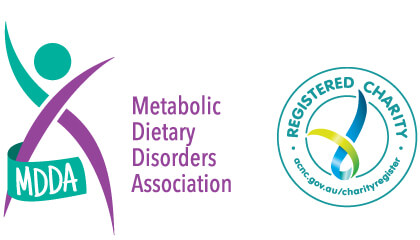MDDA President, Monique Cooper presented at Parliament House, Canberra, on the 15th February 2018 with Nicole Millis from Rare Voices Australia. Here is Monique’s speech.
Thank you Nicole….Whilst I am here today representing the MDDA as their president, I also stand before you as a parent of a child diagnosed with a rare disease known as Phenylketonuria or PKU so I only know too well the importance of advocacy in this space.
The collaboration between the MDDA and the RVA continues to strengthen and it is a great honour to be back here together at Parliament House following from our successful joint ‘fair for rare’ event held earlier last year.
The MDDA educates, connects and enables all Australians living with rare inborn errors of metabolism. We support them to achieve positive outcomes and live a life of full potential.
As the national support group, we also play an important role in informing government on policy and we work closely with the Department of Health on the administration of the IEM food grant – which many of you will be familiar with after we lobbied hard for its reinstatement back in 2015.
So for those of you less familiar, let me provide you with a non scientific 101 on Phenylketonuria or PKU?
Let me start by saying 8 years ago I knew nothing about PKU!
That was until my second child Charlie was one of the 25 babies to be born in Australia that year with it.
Just days after he was born we received a phone call that changed our lives and his forever.
What we learnt then and soon after was this…
- Firstly – PKU occurs when liver cells are unable to break down an amino acid called phenylalanine (Phe), which is found in most foods.
- Secondly – How to pronounce and spell phenylalanine and lots of other big words – it kinda grows on you!
- Thirdly and possibly the one that stands out the most were the two simple words – Brain damage! Not that I didn’t know what that was – but rather until then I had never associated those words with anyone in my life let alone my 5 day old brand new baby boy that was cradled in my arms.
After some time and adjustment, the education continued, and we then started to learn …
- How fortunate we were to receive that phone call – had Charlie not been born in Australia or had he been born 50 years earlier – he likely would have been missed and most certainly would not be sitting here like he is today enjoying a lunch at Parliament house – as a capable, happy and healthy young boy – absolutely hanging to get home and rib his sister about where he is mind you.
- How fortunate we are to have access to world class care, our supplements and foods to be able to manage our condition and prevent harm..
But we also learnt that with all this would came a heavy burden…
In order to protect Charlies brain from damage he had to adhere to a strict lifelong medically controlled diet. Severely reducing almost eliminating all forms of natural proteins from his diet.
No meat, no fish, no nuts, no seeds, no legumes, no dairy. Staples such as bread, milk, cheese, pasta, rice were all out of the equation. For god sake even chocolate, birthday cake, and many types of lollies. So what would that leave – ok a life rich with vegetables and fruits you’d think– ok can’t be so bad. What – Hang on what do you mean limited intake – measuring broccoli, avocados and bananas – even a basic potato chip can poison my boy!
It was then that I learned PKU is like no other diet – where most day to day staples replaced with medically modified foods.
The amount of protein a person with PKU can consume daily varies. It is calculated through blood Phe levels, age and growth.
- In infancy and earlier years the focus is around preventing irreversible damage to the growing brain.
- In adolescence and adulthood, the importance is on maintaining optimal brain health and preventing neurological damage. Elevated levels of Phe are toxic to the brain, leading to a drop in IQ points, poor executive and social cognitive functioning, impairing concentration, mood and energy levels. As a result, many people with PKU can experience difficulties with school work, job performance, social relationships and the list goes on.
- Maternal women – Metabolise for their unborn baby so the most strictest of controls must be put in place in order to protect the developing brain of their child.
PKU sits in a category of its own…Research states it is one of the hardest diets to comply with and data shows 70% of people struggle with compliance.
Even with the best of intentions it is an extremely difficult diet to manage and there are lots of elements outside of our control….Stress and Sickness are just two common ones to mention – with a small head cold or virus being enough to have levels skyrocket.
- Even with proper care and treatment…. emerging clinical research is showing …many adults are showing white and grey matter deficits in their brain
- Mental health issues such as depression and anxiety are common in people with PKU. They are also 50 per cent more likely to develop psychiatric disorders.
With the lack of natural proteins in the PKU diet, other health concerns are apparent…these include;
- Bone Density issues, poor body mass composition and other nutrient deficiencies
- In addition, obesity is a problem as foods high in Fats and sugars are common “go to’s” given they contain no protein. Also PKU speciality foods and supplements are loaded with sugar to improve palatability.
Whilst guidelines exist around what is considered to be safe and effective PKU management, it is still apparent that there is much more to be learnt about achieving optimal health outcomes and further tools are needed.
1 possible tool is a drug known as Kuvan –
Kuvan has been available for 11 years, and is now available in 27 countries around the world. It is currently up for review by the PBS here in Australia.
Kuvan helps to lower and stabilise phe levels to help protect the brain.
Lower phe levels enable a person with PKU to incorporate a greater range of ‘real foods’ and natural proteins into their diet.
These two benefits combined provide for greater health outcomes for patients with PKU whilst also undoubtedly improving quality of life issues that come with such a limiting diet.
You will hear over lunch from two individuals here today with PKU and some of the challenges that come with managing the PKU diet
In order to educate Australians more on PKU, the MDDA has launched the Great Protein Challenge!
This challenge gives ordinary Australians the opportunity to walk in the shoes of a person with PKU. It challenges you to reduce your protein intake to below 10 grams for 1 day (a luxury for many people living with PKU, but for most regular Aussies, a massive reduction).
Whilst I haven’t seen the exact quantities I would estimate todays delicious sounding 3 course meal is anywhere between 60-70 grams of protein.
This compares to our fellow PKU guests who are enjoying their meal at only 2 grams of protein.
If it weren’t for the flexibility of your parliamentary chef here onsite to work with us and our specialised products, all you would be seeing on the alternative would have been a small bowl of steamed vegies or a basic green salad and that’s it. Even most standard vegetarian or vegan dishes provide by venues are loaded with protein rich foods such as tofu, nuts and grains.
In the words of your chef PKU IS NOT A SPECIAL DIET, IT IS SOMETHING COMEPLETELY DIFFERENT AND NEEDS TO BE TREATED AS SUCH.
See for yourself here what your recommended daily allowance is.
My son Charlie is fortunate at 8 years old to tolerate 12 grams of protein in a day. He is considered mild for PKU. Charlie however has been on 12 grams since he was 3 years old, and most likely will remain on that for the rest of his life. As a growing boy the challenges are only going to get harder as to how to feed and sustain him so as he has the energy and ability to continue to grow and thrive.
Keep in mind Charlie is more than double the allowance of most classic PKUERs…but what I would do to give any of them the chance to be able to consume more natural protein in their diet. Just an increase in a few grams of protein a day is massive for these kids.
So whilst you sit here and enjoy your delicious protein degustation set before you today!!! We appeal to you to consider giving up your protein for a day – and seeing How Low Pro you can go.
We have already signed up our first MP – being MDDA’s local representative Michael Sukkar (who unfortunately couldn’t be here today but is taking on the challenge on February 22)
Eat like a PKUer for a day – and then ask yourself at the end – what would it mean to these people if they could have access to a treatment or medication that could change their lives – lessen their burden.
I welcome you now to enjoy you lunch (no seriously) and encourage you to spend some time chatting with those PKUers amongst us to learn more. We have some bright, capable future leaders right here in this room with us today, and it is our job as parents and as a country to protect their brains and help them to reach their full potential.
END

